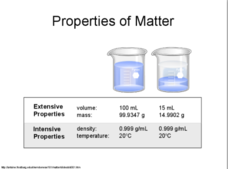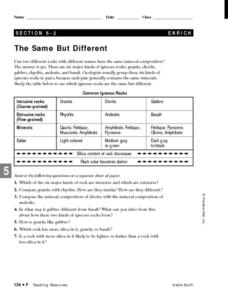American Chemical Society
Molecules Matter
Did you know that jumping spiders sometimes wear water droplets as hats? A seventh grade science lesson introduces the concept of what makes up water: tiny molecules that are attracted to each other. Starting with a chemistry discussion,...
Curated OER
Chemical Consequences of Burning Fossil Fuels
Future scientists are introduced to the chemical consequences of burning fossil fuels, learning that fossil fuel combustion leads to the formation of oxides of three nonmetals: carbon, nitrogen, and sulfur, all of which end up in the...
Normal Community High School
Density
Change the density of water by adding minerals. The presentation discusses density—from the definition to calculations—and applies it to the real world. It briefly mentions specific gravity, and finishes by showing Archimedes' principle.
Curated OER
Chapter 12 Review, Mixed Review: Solutions
Although there are only six questions on this chemistry handout, it makes a thorough review of solutions. Novices explain why a compound is not an electrolyte, identify types of compounds, and calculate moles, grams, and molalilties in...
Curated OER
Sunrise/Sunset
Third graders discovver what causes the dramatic colors of a sunset by seeing the changing color of light as it passes through a clear container of water to which milk is gradually added. They measure the liquids and observe what happens...
It's About Time
Solutions, Suspensions, and Colloids
Chemists are frequently in suspension, but not because they misbehave! Scholars mix various items with water to create solutions, suspensions, and colloids. They test each one to determine their differences and properties. The resource...
Curated OER
Alka-Seltzer Cannons
The scientific method is emphasized in this engaging and exciting chemistry lesson. Learners get to create Alka-Seltzer cannons out of film cannisters, water, and Alka-Seltzer tablets. Carbon dioxide gas builds up inside the cannister,...
Curated OER
Chapter 12 Review, Section 1: Solutions
Here is a different approach to solutions: a worksheet that has chemistry learners use words to describe them! This is an outstanding exercise that will stretch learners to show what they know. They answer questions comparing solutions,...
Curated OER
Chapter 14 Review, Section 2: Acids and Bases
Lewis acids and bases, Brønsted-Lowry acids and bases, ionization, and more are covered by this chemistry handout. It serves as a review of a specific textbook section, but will also serve as a nice review for any general chemistry...
Maryland Department of Natural Resources
Eyes on Dissolved Oxygen
Learn about the factors that affect the way oxygen dissolves in salt water with a chemistry lab. After studying the molecular structure of water, young scientists figure out how aeration, temperature, and organic waste affect dissolved...
Curated OER
Dilution and Concentration of Solutions
Future chemists practice laboratory techniques by creating a monochloramine solution. The objectives are to use of dilution, 9concentration, and measurement skills and to prepare a solution that will be used in a water treatment...
Curated OER
Chapter 13 Review, Section 2: Ions in Aqueous Solutions and Colligative Properties
Here is a general chemistry worksheet that incorporates practical applications. Four questions employ critical thinking about solutions, boiling and freezing points, and molar mass. Your class will practice what they learn in class by...
Curated OER
Chapter 13 Review, Mixed Review: Ions in Aqueous Solutions and Colligative Properties
Here is an attractive worksheet that walks chemistry learners through a review of aqueous solutions. There are matching, short answer, and multiple choice questions dealing with boiling and freezing points, precipitate, molality, net...
Curated OER
Chapter 14 Review/Acids and Bases
Two pages take chemistry learners on a survey of acids and bases. High schoolers write formulas and name compounds. They identify conjugate bases and acids with the aid of a table (not provided). On the second page, two different acids...
NOAA
The Oceanographic Yo-yo
How does chemistry help deep-sea explorers? Part four of a five-part series of lessons from aboard the Okeanos Explorer introduces middle school scientists to technologies used in ocean exploration. Groups work together to analyze data...
Curated OER
#17 Determining the Accuracy of Selected Laboratory Glassware
Students calculate the volume of a specific mass of water placed in selected pieces of common laboratory glassware, using the density formula. They then determine the accuracy of the volumetric measurement for selected pieces of...
Cornell University
Build a Fuel Cell
Discover the connection between redox reactions and fuel cells. Collaborative groups build a Hoffmann Apparatus that demonstrates the electrolysis of water and then convert their models into a fuel cell. They use their fuel cells to...
Curated OER
What Goes Down Must Come Up
Third graders explore the capillary action of plants. They discover what makes paper "grow" when water is dropped on it. Pupils observe how paper reacts as it absorbs water. Students use a variety of saturate solutions to grow crystals,...
Curated OER
The Same, But Different
Third graders examine the phase change between solids and liquids and determine it to be a physical change. Ice is the perfect item to use to demonstrate this phase change. Pupils experiment with measuring and weighing solid ice and the...
Curated OER
Kidney Structure and Function: removing intracellular waste
Your class will learn all about the function of the kidney and how it operates in animals from different habitats. The methods of absorption, filtering and excretion are detailed and pupils will learn of the different disposal methods...
Curated OER
Lipids: Fats and Oils
A fantastic presentation with great images should improve student understanding of lipids and their involvement in the body. The chemistry of different fats, phospholipids, and steroids are explained. Additionally, the specific uses,...
Beyond Benign
Breaking the Tension
The tension builds as learners experiment in your classroom. The 17th installment in a 24-part series has scholars investigate the concept of surface tension. After discovering characteristics of surface tension, they add a compound...
Curated OER
Cup Capacity Tool: Measuring Cup
Students examine containers and their capacity. They fill a one-cup measuring cup with water and pour cups of water into other containers. Through observation, students discover how many cups make a pint, and how many teaspoons make a...
Curated OER
Assessing Risks for Inhalation and Ingestion of Pollutants
Students use a hypothetical scenario to investigate inhalation of an airborne pollutant and ingestion of a waterborne pollutant. They work in pairs, investigating differences in overall exposure to contaminants by calculating inhalation...
Other popular searches
- Water Chemistry
- Lake Water Chemistry
- Water Chemistry Ions
- Co2 Water Chemistry
- Water Chemistry Lesson Plans
- Ocean Water Chemistry
- Basic Water Chemistry
- Water Chemistry Properties
- Storm Water Chemistry
- Marine Water Chemistry
- Size vs. Water Chemistry
- Water Chemistry Nitrate

























